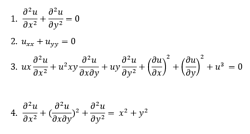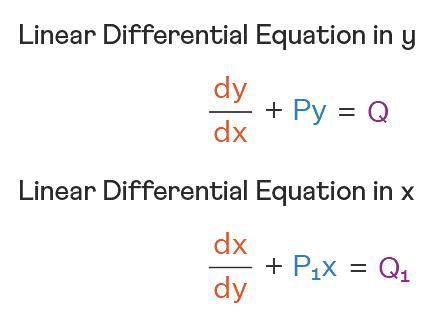Let $y=y(x)$ be the solution of the differential equation $\left(3 y^2-5 x^2\right) y d x+2 x\left(x^2-y^2\right) d y=0$ such that $y(1)=1$ Then $\left|(y(2))^3-12 y(2)\right|$ is equal to :
Let $y=y(x)$ be the solution of the differential equation $\left(3 y^2-5 x^2\right) y d x+2 x\left(x^2-y^2\right) d y=0$ such that $y(1)=1$ Then $\left|(y(2))^3-12 y(2)\right|$ is equal to :
Show Hint
- 64
- $32 \sqrt{2}$
- 32
- $16 \sqrt{2}$
The Correct Option is B
Solution and Explanation
Top Questions on types of differential equations
- Let the system of equations \(x+2y+3z = 5\), \(2x+3y+z = 9\), \(4x+3y+λz = μ\) have an infinite number of solutions. Then \(λ + 2μ\) is equal to
- JEE Main - 2024
- Mathematics
- types of differential equations
- If \( m_1 \) and \( m_2 \) are the slopes of the direct common tangents drawn to the circles \[ x^2 + y^2 - 2x - 8y + 8 = 0 \quad \text{and} \quad x^2 + y^2 - 8x + 15 = 0 \] then \( m_1 + m_2 \) is:
- TS EAMCET - 2024
- Mathematics
- types of differential equations
- If \( (2,3) \) is the focus and \( x - y + 3 = 0 \) is the directrix of a parabola, then the equation of the tangent drawn at the vertex of the parabola is:
- TS EAMCET - 2024
- Mathematics
- types of differential equations
- If the focus of an ellipse is \((-1,-1)\), equation of its directrix corresponding to this focus is \(x + y + 1 = 0\) and its eccentricity is \(\frac{1}{\sqrt{2}}\), then the length of its major axis is:
- TS EAMCET - 2024
- Mathematics
- types of differential equations
- The equation of the common tangent to the parabola \(y^2 = 8x\) and the circle \(x^2 + y^2 = 2\) is \(ax + by + 2 = 0\). If \(-\frac{a}{b}>0\), then \(3a^2 + 2b + 1 =\)
- TS EAMCET - 2024
- Mathematics
- types of differential equations
Questions Asked in JEE Main exam
- The number of numbers greater than $5000$, less than $9000$ and divisible by $3$, that can be formed using the digits $0,1,2,5,9$, if repetition of digits is allowed, is
- JEE Main - 2026
- Permutations
- Two point charges of \(1\,\text{nC}\) and \(2\,\text{nC}\) are placed at two corners of an equilateral triangle of side \(3\) cm. The work done in bringing a charge of \(3\,\text{nC}\) from infinity to the third corner of the triangle is ________ \(\mu\text{J}\). \[ \left(\frac{1}{4\pi\varepsilon_0}=9\times10^9\,\text{N m}^2\text{C}^{-2}\right) \]
- JEE Main - 2026
- Electrostatics
- Evaluate: \[ \frac{6}{3^{26}}+\frac{10\cdot1}{3^{25}}+\frac{10\cdot2}{3^{24}}+\frac{10\cdot2^{2}}{3^{23}}+\cdots+\frac{10\cdot2^{24}}{3}. \]
- JEE Main - 2026
- Integral Calculus
In the given figure, the blocks $A$, $B$ and $C$ weigh $4\,\text{kg}$, $6\,\text{kg}$ and $8\,\text{kg}$ respectively. The coefficient of sliding friction between any two surfaces is $0.5$. The force $\vec{F}$ required to slide the block $C$ with constant speed is ___ N.
(Given: $g = 10\,\text{m s}^{-2}$)
- JEE Main - 2026
- Rotational Mechanics
- If the coefficient of \( x \) in the expansion of \[ (ax^2 + bx + c)(1 - 2x)^{26} \] is \(-56\) and the coefficients of \( x^2 \) and \( x^3 \) are both zero, then \( a + b + c \) is equal to
- JEE Main - 2026
- Binomial theorem
Concepts Used:
Types of Differential Equations
There are various types of Differential Equation, such as:
Ordinary Differential Equations:
Ordinary Differential Equations is an equation that indicates the relation of having one independent variable x, and one dependent variable y, along with some of its other derivatives.
\(F(\frac{dy}{dt},y,t) = 0\)
Partial Differential Equations:
A partial differential equation is a type, in which the equation carries many unknown variables with their partial derivatives.

Linear Differential Equations:
It is the linear polynomial equation in which derivatives of different variables exist. Linear Partial Differential Equation derivatives are partial and function is dependent on the variable.

Homogeneous Differential Equations:
When the degree of f(x,y) and g(x,y) is the same, it is known to be a homogeneous differential equation.
\(\frac{dy}{dx} = \frac{a_1x + b_1y + c_1}{a_2x + b_2y + c_2}\)
Read More: Differential Equations